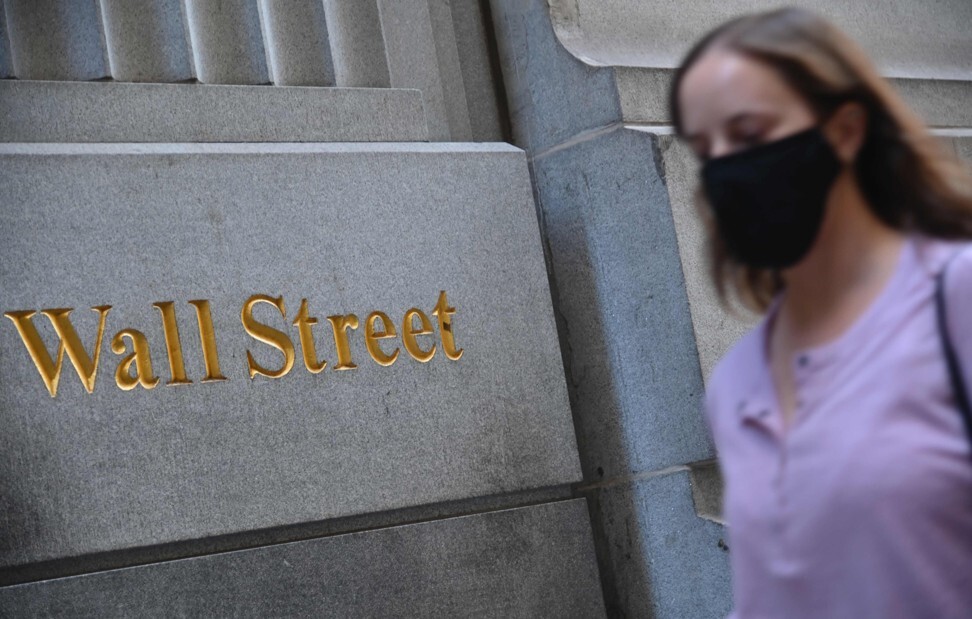
Chinese firms flood US markets for capital ahead of moves to tighten regulations, and before presidential election
- Total market capitalisation for Chinese companies on US exchanges has nearly doubled, to US$2.2 trillion, in the past year
- The financial markets are a key area where the Trump administration is looking to decouple from China beyond trade, technology and medical supplies
Chinese firms listed on the US stock exchanges have risen in numbers and by total market capitalisation in the past year despite Washington’s efforts to cut them off from US capital.
The number of US-listed Chinese companies rose 26 per cent to 217 on the three largest US exchanges – the Nasdaq, the New York Stock Exchange and the NYSE American – as of October 2, according to a congressional report by the US China Economic and Security Review Commission.
Total market has capitalisation nearly doubled to US$2.2 trillion since September 2019, the data shows. In that period, the S&P 500 index increased 16 per cent and the Dow Jones Industrial Average rose 6 per cent.
The growing appetite of Chinese companies for US capital, as well as Americans’ investment in them, came despite Trump administration efforts to decouple the capital markets from China, warning that the lack of transparency of Chinese companies that could add to their financial risks.

07:16
Hong Kong stocks will be 'fairly volatile' amid coronavirus, US-China tensions, says analyst
“There’s a clear disconnect between the US government and the private sector,” said Benn Steil, director of international economics at the Council on Foreign Relations in New York. “Nasdaq and the NYSE obviously love the initial and annual listing fees. The Chinese companies want mainly to increase awareness of their brand in the United States.
“By banning Chinese companies from listing in the US, we can certainly hurt those brand-awareness efforts but we won’t make a dent in their ability to raise capital.”
New public stock offerings by Chinese firms have so far held up.
Chinese companies have raised US$8.96 billion in US initial public offerings as of Wednesday, more than triple the US$2.6 billion from the same period last year, Dealogic data shows.
US regulator says oversight of Chinese companies remains futile
In August, Chinese online real estate brokerage KE Holdings raised US$2.1 billion on the New York Stock Exchange; it was the biggest IPO by a Chinese company in the US since 2018. The offering was priced at US$20 a share, above the planned range of US$17 to US$19.
The financial markets are one of the flashpoints as the Trump administration looks to decouple from China beyond trade, technology and medical supplies.
US President Donald Trump said in May that he was looking “very strongly” at requiring Chinese companies that list in New York to follow US accounting standards.

On May 20, the US Senate passed legislation – the Holding Foreign Companies Accountable Act – to disqualify Chinese companies from listing shares on US exchanges. The bill, which was first introduced in March 2019, is pending in the House of Representatives.
The legislation requires companies seeking access to US capital to establish that “they are not owned or controlled by a foreign government”.
It also requires the foreign companies to submit audits for inspection by the Public Company Accounting Oversight Board, the non-profit body that oversees audits of all US companies in public markets, or to be delisted if it fails to comply for three consecutive years.
Ant Group’s dual IPO in Hong Kong, Shanghai overcoming host of challenges
In August, US Treasury Secretary Steven Mnuchin moved up the delisting time line to the end of 2021.
If it becomes law, Chinese companies will be required to comply with the same rules that domestic listers follow. For more than a decade, the Chinese government has prohibited its companies from handing over financial records to the US Securities and Exchange Commission (SEC) for audit, citing national security concerns.
Since the introduction of the legislation, the chilling effect has shown up, with Alibaba, JD.com and NetEase seeking secondary listings in Hong Kong. Alibaba is the parent company of the South China Morning Post.

Shares at Yum China – the country’s largest restaurant manager, which runs KFC and Pizza Hut brands – began trading in September in Hong Kong. Baidu, China’s search-engine giant, was reportedly considering delisting from Nasdaq and listing in Hong Kong instead.
New York is missing out on some of the most notable Chinese firms. In late August, fintech giant Ant Group opted to file its initial public offerings in Hong Kong and Shanghai in what may become the largest IPO in history, with a plan to raise at least 10 per cent in new shares of the US$30 billion of valuation.
Meanwhile, the US government’s crackdown on Chinese listings has intensified.
Why did China’s forex reserves fall by US$22 billion in September?
The President’s Working Group on Financial Markets released a report in August designating the SEC to address risks by Chinese companies. The SEC said it was preparing proposals to tighten listing rules.
The US State Department has written a letter to the board of directors of American universities and colleges asking that they divest their endowments from Chinese holdings.
“Knowing the situation could probably deteriorate, and there is an election coming in about a month, what actually happened was the activity has accelerated,” said Drew Bernstein at accounting firm Marcum Bernstein & Pinchuk.

